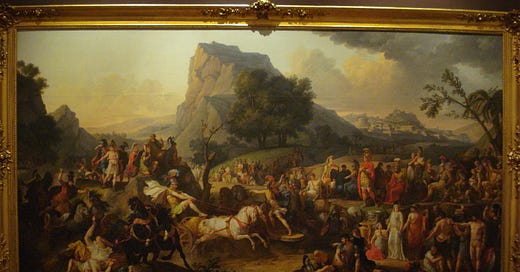The final end of Achilles’ anger is worked out through the mourning and the funeral and the funeral games for Patroclos.
I see especially a parallel between the contention that started off the downward spiral to Achilles’ anger, and another contention after the chariot race of the funeral games.
It had started less than a month ago, when Chryses, a priest of Apollo, came to ransom his daughter, whom the Argive soldiers had given to Agamemnon after a successful raid / battle. The soldiers encouraged him to accept the ransom and return the girl. Although he is within his rights to refuse, he goes too far, insults the priest, and incurs the wrath of Apollo.
Now, Patroclos has been cremated, his bones interred in a golden urn, and the burial mound raised. The funeral games are on.
Five charioteers are racing. The two best racers, with the best horses, are Diomedes and Eumelos. Apollo takes the side of Eumelos. When Diomedes starts to pass him, he knocks the whip out of his hand, keeping him from passing. At which point Athena takes the side of Diomedes. She not only gives him his whip back, she breaks the yoke keeping Eumelos’ horses together, and he is thrown from the cart. He’s gone from first or second place to dead last, coming in on foot, pulling his cart, and driving his horses at a walk.
Achilles feels sorry for Eumelos. Diomedes was clearly in first place, but Achilles would like to offer Eumelos the second place prize, a six-year-old unbroken mare, pregnant with a mule foal. The soldiers agree, but the man who actually did come in second, Antilokhos, doesn’t want to give up the second place prize. He’s ready to fight for the mare. Unlike Agamemnon with the priest, though, he doesn’t insult either Achilles or Eumelos, but just suggests Achilles give Eumelos something different. Which was exactly what Achilles had recommended to Agamemnon.
To this, both Achilles and Eumelos readily agree.
But now, Menelaus, who just barely missed being second himself, insists he wants the mare. Antilokhos was playing “chicken” at the turnaround point of the race, which is how he managed to get past Menelaus. He just barely managed to keep his lead long enough to beat him back to the finish line. Menelaus wants him to “swear you did not mean to foul my car” 1.
It is not exactly like Agamemnon insisting he must have Achilles’ prize specifically, but it echoes.
Instead of falling into an exchange of insults, Antilokhos, who at best really was driving recklessly, backs off, claiming the poor judgment of youth, and the desire to keep the esteem of the older man. He won’t insist on this particular prize.
This gives Menelaus the space to act as the gracious elder, and let Antilokhos take the prize mare.
Finally, the last competition of the funeral games is the javelin throw. Achilles decides to just give Agamemnon the prize for that without any contest at all, because he’s clearly the best spear thrower. While one person I read thought Achilles was being hypocritical here, because of the insults he’d made of Agamemnon when he was talking plainly, I disagree. Achilles wasn’t necessarily thinking one thing and saying another. He never claimed Agamemnon wasn’t a powerful spear thrower. It struck me as honest and an act of graciousness.
Is this a hint of how it could have gone in Book 1, if Agamemnon hadn’t insulted Chryses, and then Achilles? And if Achilles himself had controlled his temper? The men didn’t have to let the manipulation of the gods affect how they treated each other.
Achilles’ anger is not quite done, though. There will still be eleven mornings of Achilles dragging the body of Hector three time around the burial mound of Patroclos.
And the gods are still arguing. Most are now in favor of getting the body of Hector, which Apollo and Aphrodite have been keeping from corruption, back to his father now.
Apollo argues:
The man has lost all mercy; he has no shame – that gift that hinders mortals but helps them, too. A sane one may endure an even dearer loss: a blood brother, a son; and yet, by heaven, having grieved and passed through mourning, he will let it go. Robert Fitzgerald, Book XXIV
But Hera argues that Hector, son of a mortal woman, should not get higher honor than Achilles, the son of Thetis, a goddess. Zeus shuts that argument down. Giving the body back to Priam does not mean Hector is being honored above Achilles. It is enough to be a good and pious man, even without immortal parentage. Is this the first time in the Iliad that the gods make clear that even a mortal man can matter?
Achilles is still touchy, but he will finally let his anger go. Not just his anger against Agamemnon, which he released earlier, but also the unbounded anger against Hector and the Trojans. Will it come back? I’m not sure of the part of the story of Achilles after the Iliad. But for now, the story of his anger is over.
Andromache mourns. Her son will die and she will go into captivity and she will become the concubine Achilles’ son, Neoptolemos. And yet, she will live into old age with children that outlive her, unlike Achilles and his son, Neoptolemos. The grandson of Achilles will support his mother in that old age.
But that is another story.
From the Iliad, translated by Robert Fitzgerald, Book XXIII





Yes, she does. But in the Aeneid, at least, she is the concubine of Neoptolemos first, until he gives her to Helenus, who is also a slave of Neoptolemus. I'm sure there are other versions though.
Andromache ends up with Helenus, the brother of Hektor.